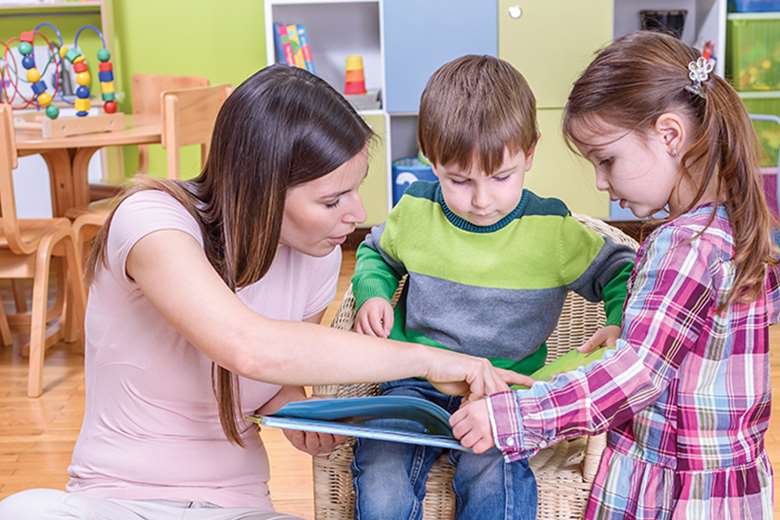Early Learning and School Readiness: Research Evidence
Derren Hayes
Wednesday, July 26, 2017
These academic studies have been summarised by Dr Jane Murray and Dr Rory McDowall Clark on behalf of TACTYC - The Association for Professional Development in the Early Years

STUDY 4
Study of Early Education and Development (SEED): Good Practice in Early Education
Meg Callanan, Margaret Anderson, Sarah Haywood, Ruth Hudson and Svetlana Speight - NatCen Social Research (2017)
This research report is part of a large-scale UK study running from 2013-2020 that builds on the EPPE/EPPSE study led by Professor Kathy Sylva (1997-2014). The SEED study is an evaluation of the effect of early education on children's outcomes, the quality of provision and value for money of providing funded early years education to 6,000 two-year-olds from lower income families. The component study that informs this report explored how good-quality early years settings articulate, establish and sustain good practice that has the potential to improve child outcomes.
Sixteen case study examples of good practice were selected for this report from a wider sample of early education settings for which provision quality was judged "good" or "excellent", according to adapted versions of the Early Childhood Environmental Rating Scale. Nursery classes, private and voluntary settings were included and 103 interviews were conducted with settings' managers, early education staff, parents and local authority workers.
Learning and development
Respondents suggested "good practice" in curriculum planning features flexible planning according to children's individual needs and interests. They only considered assessment, monitoring and tracking children's progress to be good practice when it is used diagnostically to inform children's learning and development.
Setting staff made suggestions for "what works" when supporting children's learning and development and identified supporting children's personal, social and emotional development as paramount, for example by encouraging children's self-regulation, provision of "language rich" environments and well-trained staff.
Management and Leadership
Respondents regarded effective leadership as essential, characterised by:
- Clear vision
- Encouraging team working
- Secure professional knowledge in all staff
- Positive relationships
- Consistently seeking improvement
- Good organisation.
Communication between staff was also considered important as a foundation for other elements of good practice, as was continuous evaluation of practice because it results in constant improvement and partnership working and sources of advice including local authority support, Ofsted, specialist children's services, partnership working with children's centres and early years specialist teachers.
Staff recruitment, retention and development
Recruitment of high-quality staff was considered vital, but was acknowledged to be difficult to achieve because of poor pay. Respondents regarded high-quality staff as practitioners who understand child development and the Early Years Foundation Stage, are well qualified, interact well with children, are enthusiastic about early education and engage effectively with parents. Soft skills were regarded as characteristic of high-quality staff; mixing staff with different levels of experience was considered good practice; and the highest possible staff-to-child ratios were viewed as desirable.
Engaging with parents and home learning
Parents were less concerned about staff qualifications: some just assumed all staff would have relevant qualifications, while other parents emphasised experience and the quality of interactions. Settings staff highlighted a range of strategies they use for effective communication with parents, including trust, building individual relationships with parents, adjusting how they communicate with each parent, avoiding judging parents and sharing information with colleagues so all staff can support parents. Settings held parents' evenings and shared children's progress records with parents. Some settings shared online assessment and monitoring systems with parents, which some liked and some did not.
Settings said they supported home learning strategies to encourage high-quality interactions between parents and children, to help children to experience smooth transitions between home and the setting, to encourage learning for pleasure and to help older children to get ready for school. Respondents thought good practice included good staff relationships with parents, making home learning manageable for parents and giving children choice and control about their home learning activities.
Implications for practice
Three cross-cutting themes for good practice in early education emerge in this report and these constitute implications for practice:
- Good practice is tailored to children's needs
- Skilled and experienced staff support good practice
- An open and reflective culture supports good practice.
FURTHER READING
The Excellence of Play. 4e. Moyles, J. Maidenhead: Open University Press/McGraw Hill Education. (2015)
When You Are Born Matters: The Impact of Date of Birth on Educational Outcomes in England. London: Institute for Fiscal Studies. (2010)
The Gift of Time? School Starting Age and Mental Health. (CEPA Working Paper No.15-08). Dee, T. and Sievertsen, H.H. (2015), Retrieved from Stanford Center for Education Policy
Teaching Four and Five Year Olds: The Hundred Review of the Reception Year in England. Dubiel, J. and Kilner, D Huddersfield: Early Excellence Centre for Inspirational Learning. (2017)
Publications from TACTYC:
Relationship-based Pedagogies with Babies and Toddlers: Issues for Teaching and Implications for Learning. (Online) Degotardi, S. (2015)
Two-year-olds in England: an Exploratory Study. (Online) Georgeson, J., Campbell-Barr, V., Mathers, S., Boag-Munroe, G., Parker-Rees, R. and Caruso, F. (2014).
Exploring the Contexts for Early Learning: Challenging the School Readiness Agenda. McDowall Clark, R. Abingdon: Routledge. (2016)
Building Knowledge in Early Childhood Education: Young Children are Researchers. Murray, J. Abingdon: Routledge. (2017)
http://tactyc.org.uk/




